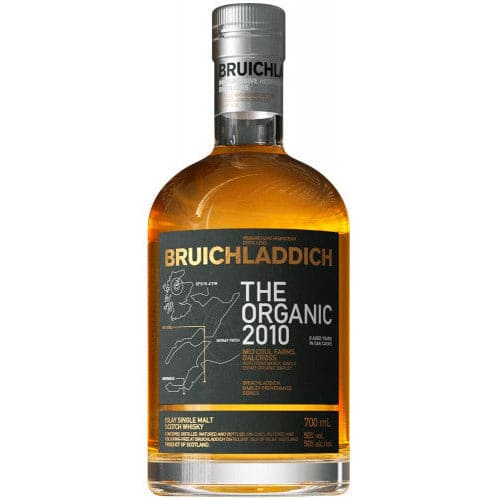
Bruichladdich The Organic 2010 Single Malt Scotch Whisky
This creamy whisky is produced from 100% Scottish organic barley, using slow trickle distillation and premium American oak.
Bruichladdich is an award-winning distillery employing generations of distilling knowledge and the principle of minimal intervention. Built in 1881 on the wild Scottish island of Islay, Bruichladdich distillery still uses the original Victorian equipment to create a range of single malt whiskies that are trickle distilled, matured and bottled solely on Islay by a skilled team of 78 men and women.
Bruichladdich implements revolutionary, modern interpretations of time-honored ideas and challenges the comfortable conventions of a whisky establishment. Rejecting the onset of modern automation and homogenization, Bruichladdich's Head Distiller, Adam Hannett, only considers production methods that place the quality of liquid above everything else.
100% Scottish organic barley, slow trickle distillation and premium American oak have produced the creamiest whisky to come out of Bruichladdich. During the Victorian times when Bruichladdich Distillery was built, all Scottish barley was grown organically. The relationship between distiller, farmer and soil was intimate and enduring. These ties were lost as modern industrialized farming cut through ancient synergies. Bruichladdich Organic is an ode to ancient traditions.

Explore a World of Spirits and Liquor through our Comprehensive FAQ Section.
Discover a World of Spirits and Liquor in our Helpful FAQ Section.
Types of Spirits
- Whiskey: Made from fermented grain mash and aged in wooden casks.
- Vodka: Typically distilled from grains or potatoes and known for its clear, neutral flavor.
- Rum: Produced from sugarcane byproducts like molasses or sugarcane juice.
- Tequila: Made from the blue agave plant, primarily in the area surrounding Tequila, Mexico.
- Gin: Distilled with botanicals, primarily juniper berries, giving it a distinctive flavor.
Production Process
- Fermentation: The process where yeast converts sugars into alcohol.
- Distillation: Separating alcohol from the fermented mixture to increase its concentration.
- Aging: Storing spirits in barrels to develop flavors over time.
Tasting and Pairing
- Tasting Notes: Learn to identify different aromas, flavors, and textures.
- Food Pairings: Discover which spirits complement various dishes, enhancing the dining experience.
Cocktails and Mixology
- Classic Cocktails: Recipes and techniques for making popular drinks like the Old Fashioned, Martini, and Mojito.
- Mixology Tips: How to balance flavors and create your own cocktail recipes.
History and Culture
Origins: The historical background of different spirits.
Cultural Significance: How spirits are enjoyed and celebrated around the world.

